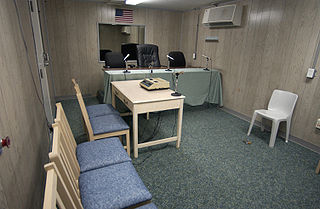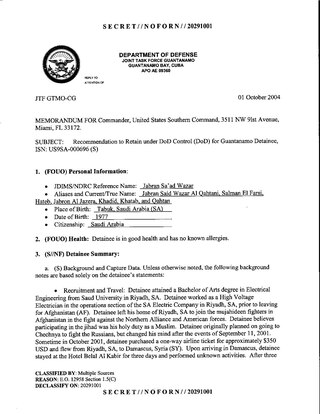
An unlawful combatant, illegal combatant or unprivileged combatant/belligerent is a person who directly engages in armed conflict in violation of the laws of war and therefore is claimed not to be protected by the Geneva Conventions. The International Committee of the Red Cross points out that the terms "unlawful combatant", "illegal combatant" or "unprivileged combatant/belligerent" are not defined in any international agreements. While the concept of an unlawful combatant is included in the Third Geneva Convention, the phrase itself does not appear in the document. Article 4 of the Third Geneva Convention does describe categories under which a person may be entitled to prisoner of war status. There are other international treaties that deny lawful combatant status for mercenaries and children.

The Combatant Status Review Tribunals (CSRT) were a set of tribunals for confirming whether detainees held by the United States at the Guantanamo Bay detention camp had been correctly designated as "enemy combatants". The CSRTs were established July 7, 2004 by order of U.S. Deputy Secretary of Defense Paul Wolfowitz after U.S. Supreme Court rulings in Hamdi v. Rumsfeld and Rasul v. Bush and were coordinated through the Office for the Administrative Review of the Detention of Enemy Combatants.
Hamdan v. Rumsfeld, 548 U.S. 557 (2006), is a case in which the Supreme Court of the United States held that military commissions set up by the Bush administration to try detainees at Guantanamo Bay violated both the Uniform Code of Military Justice (UCMJ) and the Geneva Conventions ratified by the U.S.

Salim Ahmed Hamdan is a Yemeni man, captured during the invasion of Afghanistan, declared by the United States government to be an illegal enemy combatant and held as a detainee at Guantanamo Bay from 2002 to November 2008. He admits to being Osama bin Laden's personal driver and said he needed the money.
Competent Tribunal is a term used in Article 5 paragraph 2 of the Third Geneva Convention, which states:
Should any doubt arise as to whether persons, having committed a belligerent act and having fallen into the hands of the enemy, belong to any of the categories enumerated in Article 4, such persons shall enjoy the protection of the present Convention until such time as their status has been determined by a competent tribunal.

Jabran Said Bin Wazir al-Qahtani is a Saudi who was held in extrajudicial detention for almost fifteen years in the United States Guantanamo Bay detention camps, in Cuba. Joint Task Force Guantanamo analysts estimate he was born in 1977, in Tabuk, Saudi Arabia.
Peter E. Brownback III is a retired military officer and lawyer. He was appointed in 2004 by general John D. Altenburg as a Presiding Officer on the Guantanamo military commissions. The Washington Post reported: "...that Brownback and Altenburg have known each other since 1977, that Brownback's wife worked for Altenburg, and that Altenburg hosted Brownback's retirement party in 1999."
Hamidullah was a citizen of Afghanistan, who was held in extrajudicial detention in the United States's Guantanamo Bay detention camps, in Cuba. His Guantanamo Internee Security Number is 1119. Joint Task Force Guantanamo counter-terrorism analysts estimate he was born in 1963, in Kabul, Afghanistan.
Faris Muslim al Ansari is a citizen of Afghanistan who was seventeen years old when captured and held in the United States's Guantanamo Bay detention camps, in Cuba. His Guantanamo Internment Serial Number was 253. American intelligence analysts estimate that Al Ansari was born in 1984 in Mukala, Yemen.
Jawad Jabber Sadkhan is a citizen of Iraq who was held in extrajudicial detention in the United States Guantanamo Bay detainment camps, in Cuba. Sadkhan's Guantanamo Internment Serial Number was 433.
Abdul Majid Muhammed is a citizen of Iran who was held in extrajudicial detention in the United States Guantanamo Bay detention camp in Cuba.

The Military Commissions Act of 2006, also known as HR-6166, was an Act of Congress signed by President George W. Bush on October 17, 2006. The Act's stated purpose was "to authorize trial by military commission for violations of the law of war, and for other purposes".
No-Hearing Hearings (2006) is the title of a study published by Professor Mark P. Denbeaux of the Center for Policy and Research at Seton Hall University School of Law, his son Joshua Denbeaux, and prepared under his supervision by research fellows at the center. It was released on October 17, 2006. It is one of a series of studies on the Guantanamo Bay detention center, the detainees, and government operations that the Center for Policy and Research has prepared based on Department of Defense data.
Nasir Maziyad Abdallah Al Qurayshi Al Subii is a citizen of Saudi Arabia who was held in extrajudicial detention in the United States Guantanamo Bay detention camps, in Cuba. His Guantanamo Internment Serial Number was 497. American counter-terror analysts estimate he was born in 1983, in Al Arib, Saudi Arabia.
The Personal Representative is an officer who serves before the Combatant Status Review Tribunals, convened for the captives the United States holds in extrajudicial detention in the Guantanamo Bay detention camps, in Cuba.
The Combatant Status Review Tribunal the US Department of Defense commissioned, like the tribunals described in Army Regulation 190-8, which they were modeled after, were three member panels, led by a tribunal president.
Keith Johns Allred was an American Naval officer and Naval trial lawyer, beginning his career with the US Seventh Fleet aboard several Naval destroyers, from 1979-1982. From 1985, until his retirement in 2009, he oversaw the Western Pacific Judicial Circuit as a Circuit Trial Judge. He was also the presiding judge at the Guantanamo military commission where he notably oversaw the trial of Salim Hamdan.
A Legal Advisor and an Assistant Legal Advisor were part of the Office for the Administrative Review of Detained Enemy Combatants team tasked to conduct Combatant Status Review Tribunals of captives held in extrajudicial detention in the United States Guantanamo Bay detention camps in Cuba.
Every Administrative Review Board, run under the authority of the Office for the Administrative Review of Detained Enemy Combatants, was commanded by a Presiding Officer.
Initially the Bush Presidency asserted that they did not have to release any of the Guantanamo captive's documents. They asserted that no captive apprehended in Afghanistan was entitled to the protections of the Geneva Convention, and that those held in the Guantanamo Bay Naval Base were not protected by US law either, because it was not on US territory.




